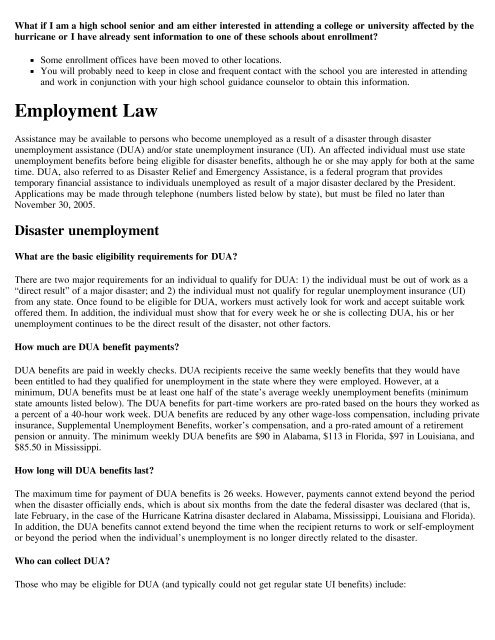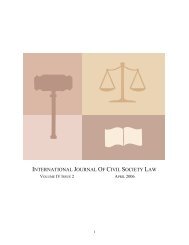Hurricane Katrina: Legal Issues - Columbus School of Law
Hurricane Katrina: Legal Issues - Columbus School of Law
Hurricane Katrina: Legal Issues - Columbus School of Law
You also want an ePaper? Increase the reach of your titles
YUMPU automatically turns print PDFs into web optimized ePapers that Google loves.
What if I am a high school senior and am either interested in attending a college or university affected by the<br />
hurricane or I have already sent information to one <strong>of</strong> these schools about enrollment?<br />
Some enrollment <strong>of</strong>fices have been moved to other locations.<br />
You will probably need to keep in close and frequent contact with the school you are interested in attending<br />
and work in conjunction with your high school guidance counselor to obtain this information.<br />
Employment <strong>Law</strong><br />
Assistance may be available to persons who become unemployed as a result <strong>of</strong> a disaster through disaster<br />
unemployment assistance (DUA) and/or state unemployment insurance (UI). An affected individual must use state<br />
unemployment benefits before being eligible for disaster benefits, although he or she may apply for both at the same<br />
time. DUA, also referred to as Disaster Relief and Emergency Assistance, is a federal program that provides<br />
temporary financial assistance to individuals unemployed as result <strong>of</strong> a major disaster declared by the President.<br />
Applications may be made through telephone (numbers listed below by state), but must be filed no later than<br />
November 30, 2005.<br />
Disaster unemployment<br />
What are the basic eligibility requirements for DUA?<br />
There are two major requirements for an individual to qualify for DUA: 1) the individual must be out <strong>of</strong> work as a<br />
“direct result” <strong>of</strong> a major disaster; and 2) the individual must not qualify for regular unemployment insurance (UI)<br />
from any state. Once found to be eligible for DUA, workers must actively look for work and accept suitable work<br />
<strong>of</strong>fered them. In addition, the individual must show that for every week he or she is collecting DUA, his or her<br />
unemployment continues to be the direct result <strong>of</strong> the disaster, not other factors.<br />
How much are DUA benefit payments?<br />
DUA benefits are paid in weekly checks. DUA recipients receive the same weekly benefits that they would have<br />
been entitled to had they qualified for unemployment in the state where they were employed. However, at a<br />
minimum, DUA benefits must be at least one half <strong>of</strong> the state’s average weekly unemployment benefits (minimum<br />
state amounts listed below). The DUA benefits for part-time workers are pro-rated based on the hours they worked as<br />
a percent <strong>of</strong> a 40-hour work week. DUA benefits are reduced by any other wage-loss compensation, including private<br />
insurance, Supplemental Unemployment Benefits, worker’s compensation, and a pro-rated amount <strong>of</strong> a retirement<br />
pension or annuity. The minimum weekly DUA benefits are $90 in Alabama, $113 in Florida, $97 in Louisiana, and<br />
$85.50 in Mississippi.<br />
How long will DUA benefits last?<br />
The maximum time for payment <strong>of</strong> DUA benefits is 26 weeks. However, payments cannot extend beyond the period<br />
when the disaster <strong>of</strong>ficially ends, which is about six months from the date the federal disaster was declared (that is,<br />
late February, in the case <strong>of</strong> the <strong>Hurricane</strong> <strong>Katrina</strong> disaster declared in Alabama, Mississippi, Louisiana and Florida).<br />
In addition, the DUA benefits cannot extend beyond the time when the recipient returns to work or self-employment<br />
or beyond the period when the individual’s unemployment is no longer directly related to the disaster.<br />
Who can collect DUA?<br />
Those who may be eligible for DUA (and typically could not get regular state UI benefits) include:

















